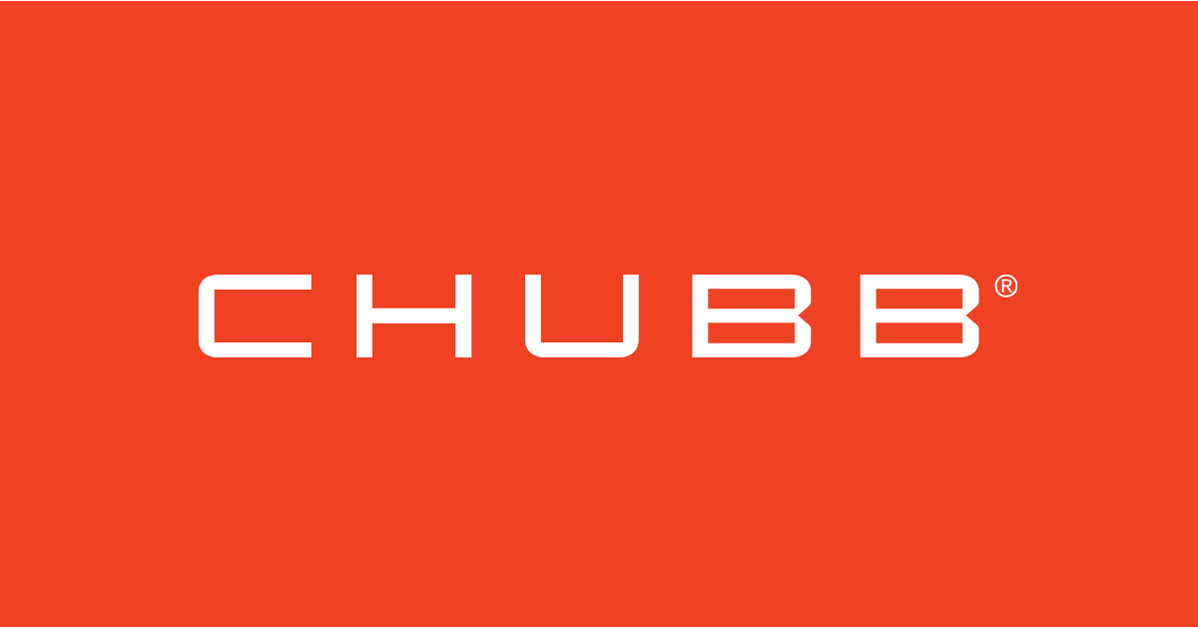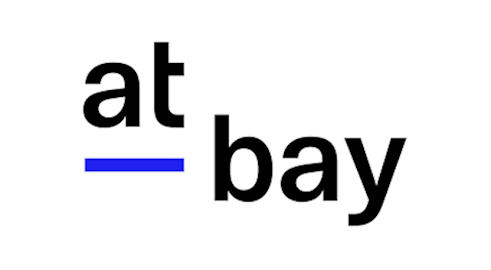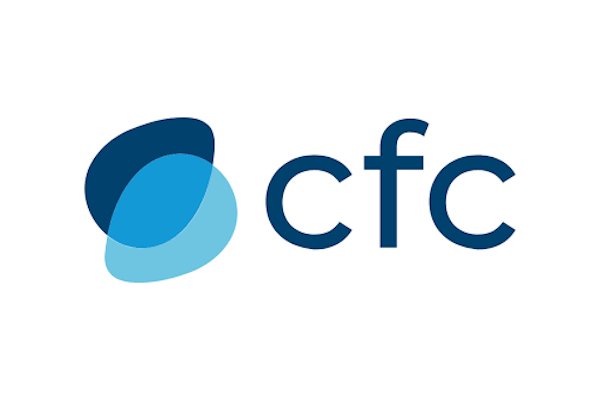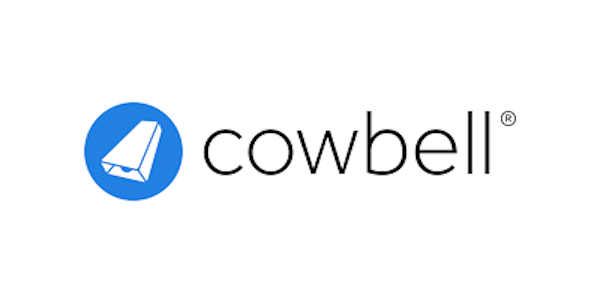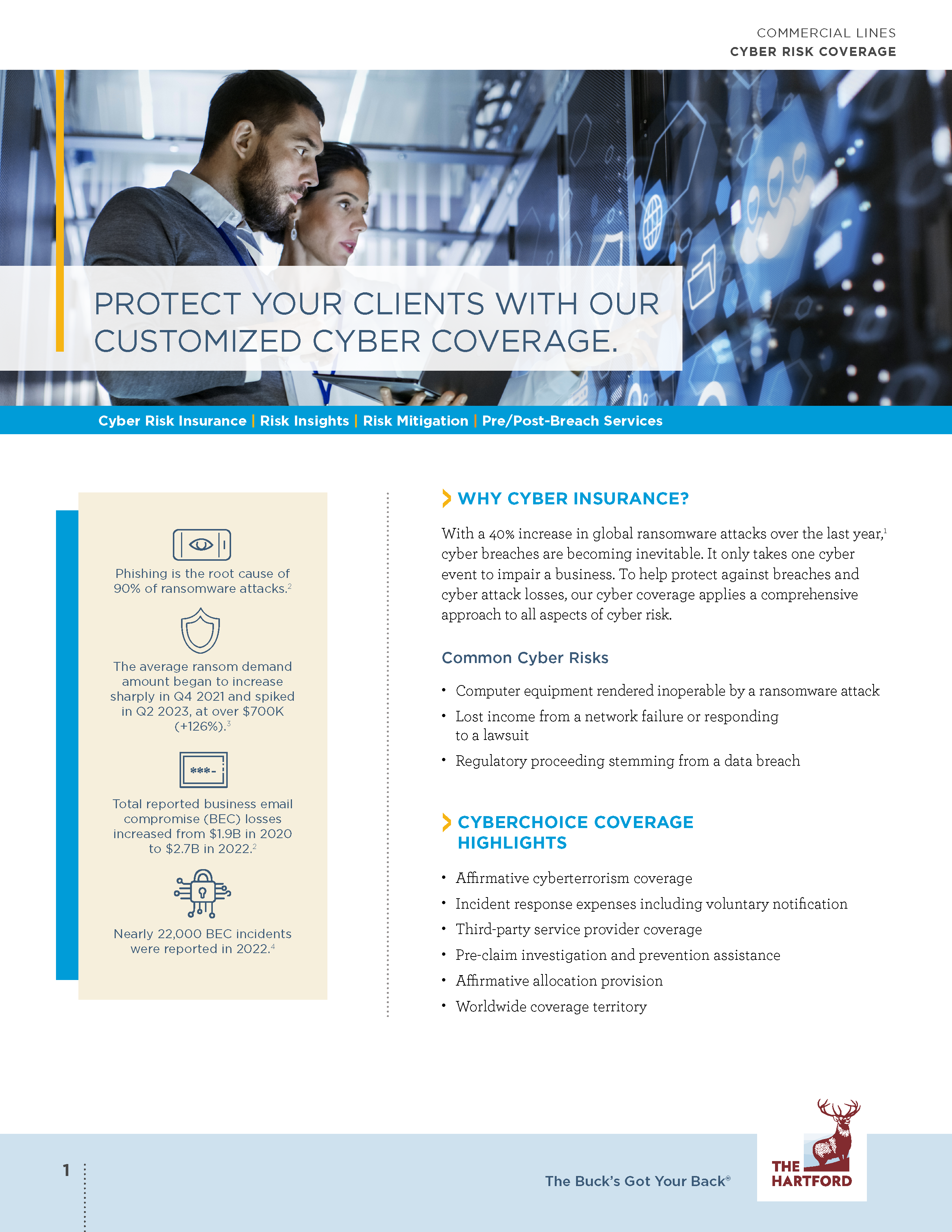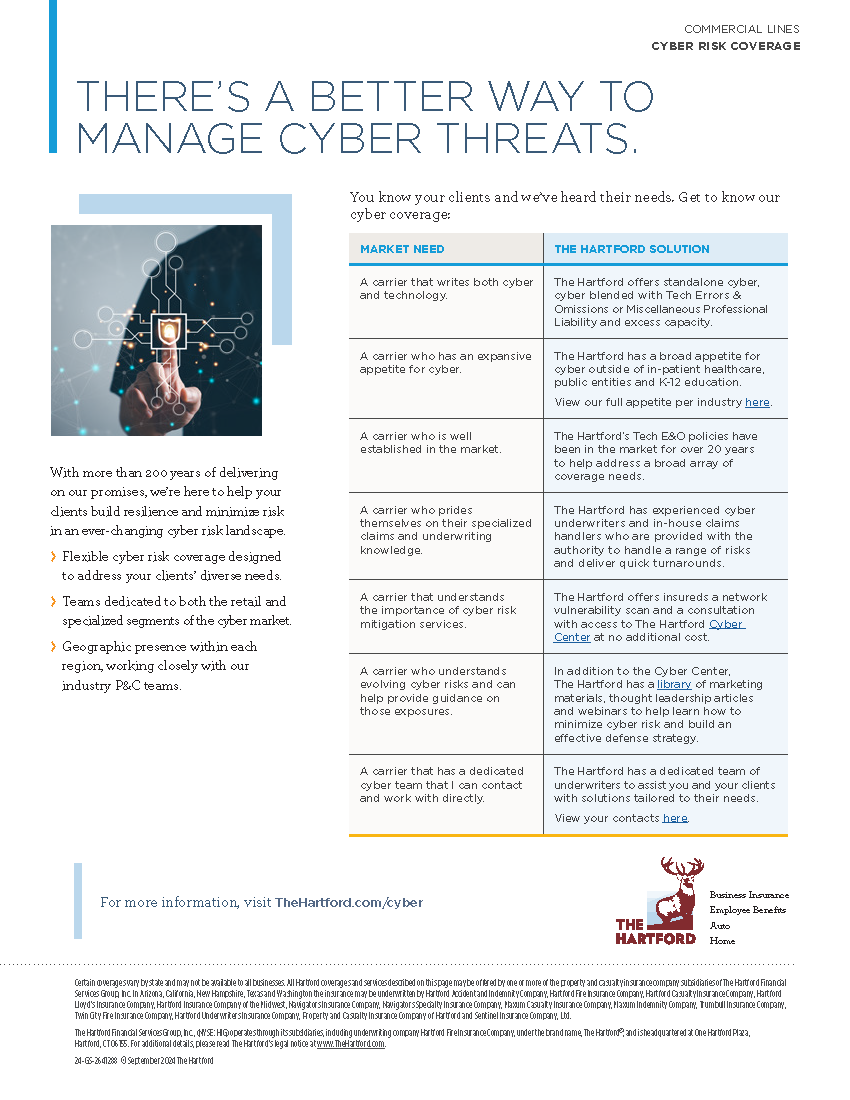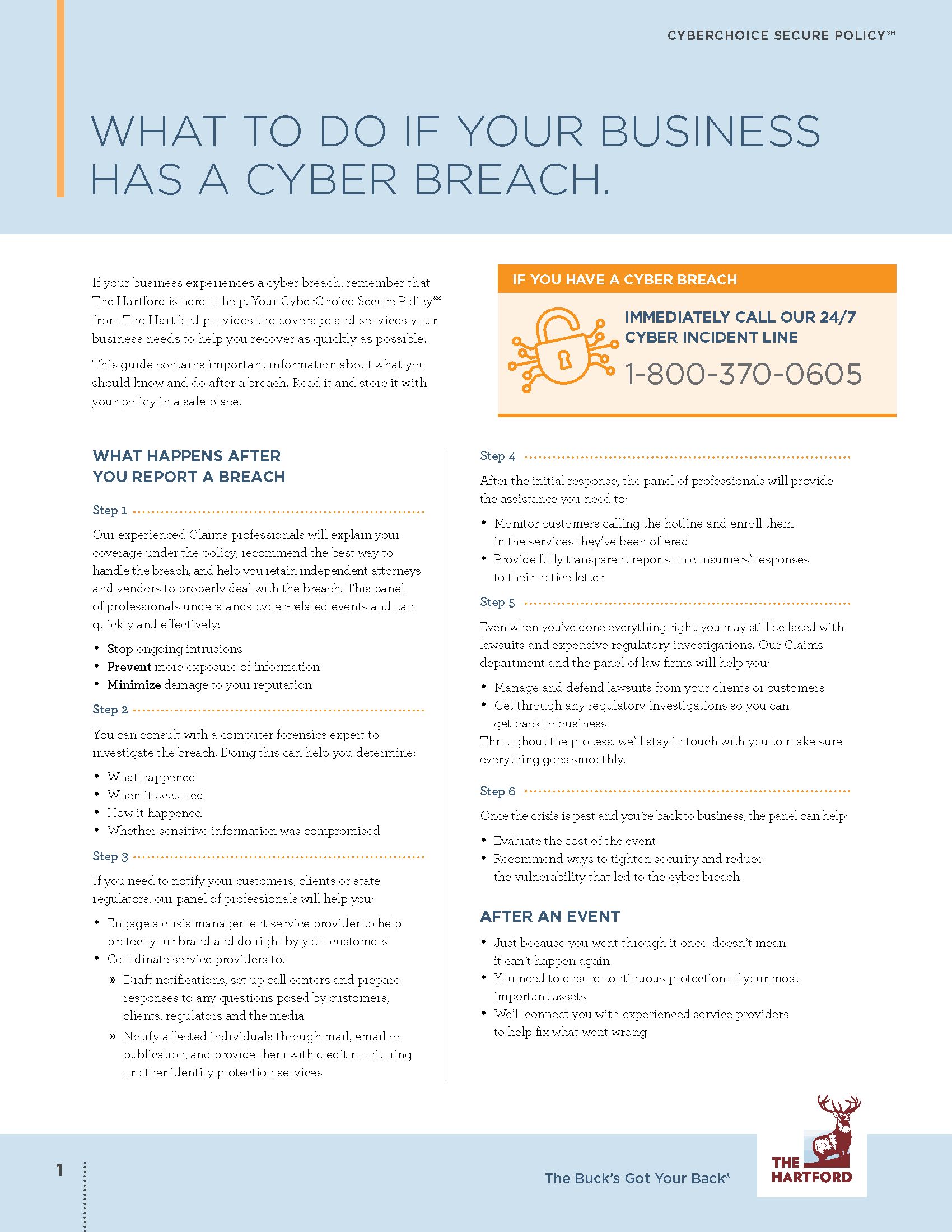The Hartford Videos

The Hartford Cyber Insurance
The Hartford offers comprehensive cyber risk insurance designed to protect businesses and provide essential cyber services to maintain operations during incidents. Their coverage includes standalone cyber insurance, options blended with Tech Errors & Omissions or Miscellaneous Professional Liability, and excess capacity. The Hartford’s cyber team is dedicated to helping clients stay prepared against evolving cyber risks, offering the latest insights, education, and resources to understand and mitigate potential threats.
In addition to insurance coverage, The Hartford provides valuable cyber risk mitigation services to its clients. These include a network vulnerability scan and access to The Hartford Cyber Center at no additional cost. The company also offers a library of marketing materials, thought leadership articles, and webinars to help businesses learn how to minimize cyber risks and build effective defense strategies. With experienced cyber underwriters and in-house claims handlers, The Hartford prides itself on its specialized knowledge and ability to handle a range of risks with quick turnarounds.
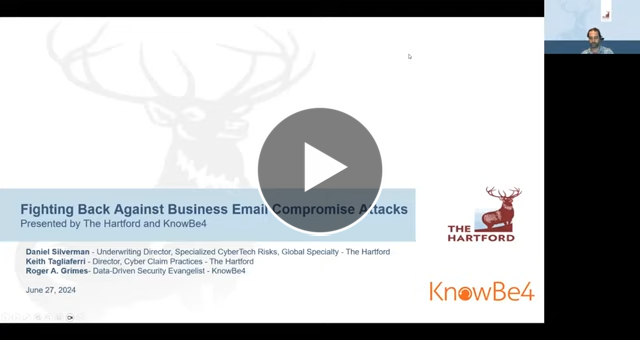
Business Email Compromise
This video discusses business email compromise (BEC) scams, a prevalent cybersecurity threat that has cost businesses billions of dollars worldwide. The presentation explains that BEC scams are sophisticated social engineering attacks targeting companies to execute unauthorized money transfers. These attacks often involve spear phishing, where criminals impersonate legitimate business contacts or executives to trick employees into making payments. The video provides numerous examples of high-profile BEC scams, including incidents involving major corporations like Google and Facebook. It also highlights the emerging threat of AI-generated deepfakes in BEC attacks, where artificial intelligence is used to create convincing audio or video impersonations.
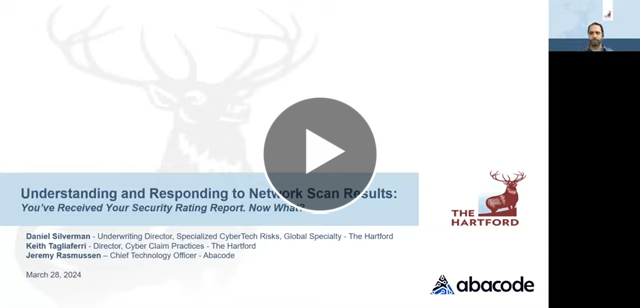
Network Security Scans
This video presents a cybersecurity webinar hosted by The Hartford. The discussion focuses on understanding and responding to network scan results, emphasizing the importance of identifying and addressing vulnerabilities before cybercriminals can exploit them. The presenters explain how tools like BitSight can provide organizations with vulnerability reports and security scores. They delve into various aspects of cybersecurity, including certificate security, port security, ransomware protection, and email security. The webinar highlights the significance of implementing proper security measures, such as using strong SSL/TLS certificates, managing vulnerabilities, and maintaining good network hygiene.
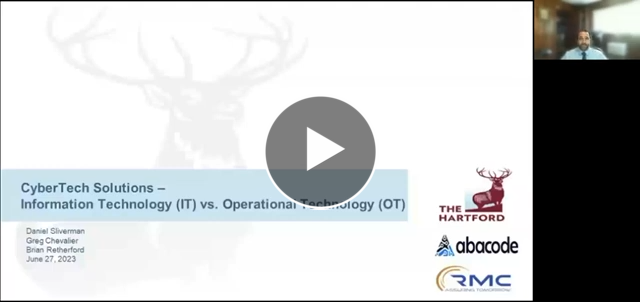
IT vs OT
This video discusses the growing importance of operational technology (OT) security in cyber insurance and risk management. The speakers explain the differences between IT and OT systems, highlighting the unique challenges in securing OT environments. They emphasize that OT systems, which control physical processes in industries like manufacturing and healthcare, are increasingly vulnerable to cyber-attacks due to their connectivity and lack of built-in security features. The presentation covers the evolution of OT systems, the rising costs of OT-related breaches, and the shortage of skilled professionals in this field. The speakers stressed the need for organizations to develop comprehensive OT security strategies, considering factors such as network segmentation, intrusion detection, and risk-based prioritization. They also touch on the implications for cyber insurance and the importance of assessing OT security posture when underwriting policies.
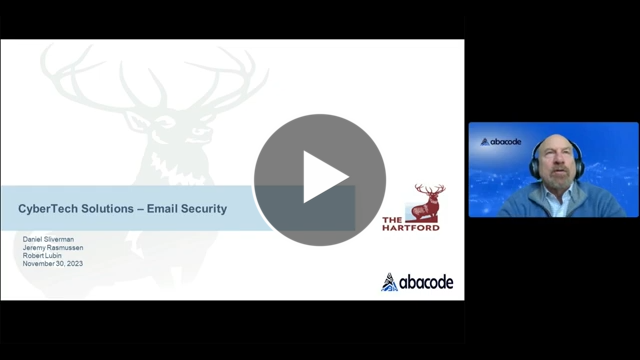
Email Security
This video discusses email security best practices and solutions to protect organizations from cyber threats. The presenters explain various email security measures, such as SPF, DKIM, and DMARK, which help prevent email spoofing and phishing attacks. They emphasize the importance of a layered security approach, including DNS authentication settings, malicious attachment blocking, DNS filtering, multi-factor authentication, and user education. The video also covers the significance of continuous monitoring and threat intelligence in detecting and responding to potential breaches. Additionally, the presenters highlight the need for email encryption to protect sensitive information from eavesdropping during transmission.
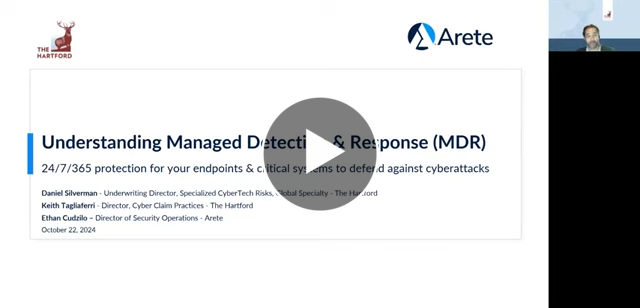
Managed Detection & Response
This video presents a webinar on understanding Managed Detection and Response (MDR) in cybersecurity. The speakers discuss the importance of MDR as a solution to complex cybersecurity problems. They explain the evolution from traditional antivirus to Endpoint Detection and Response (EDR) platforms, highlighting the limitations of signature-based detection and the advantages of real-time threat analysis. The presentation covers the benefits of EDR, such as automated threat response and comprehensive data collection, and touches on the rise of ransomware attacks, particularly mentioning the LockBit group. They demonstrate the power of EDR using Sentinel One as an example, showing how it can effectively counter ransomware like LockBit 5.0.

How Data Loss Happens
This video discusses the various ways data loss can occur in businesses today. While hacking from external sources is a major concern and often makes headlines, the video emphasizes that internal threats are equally important. These internal risks include unintentional actions by employees, such as sending misdirected emails or failing to change passwords, and deliberate acts, like disgruntled employees taking information to their next job. The speaker points out that these internal incidents occur as frequently as external hacking attempts. Importantly, the video highlights that data loss is not always the result of criminal activity but can also stem from employee errors. This perspective underscores businesses’ need to address external and internal data security threats with equal diligence.

Data Breach Exposure
This video discusses the vulnerability of businesses to data breaches, emphasizing that all companies handling personal information are at risk. The focus is primarily on customer records containing personally identifiable information such as Social Security numbers, addresses, and financial details, which are stored electronically and in paper form. The speaker notes that data breach concerns vary by industry and are proportional to the amount of information collected. Even small businesses with proprietary information face risks. The video highlights recent incidents involving large retail chains that lost millions of customer records, potentially leading to identity theft. The primary message is that once a business collects personal information, it becomes its responsibility to protect it, and any resulting losses from a breach would be the business owner’s liability.

Website Security
This video discusses six essential steps for ensuring website security. These best practices include regularly updating software to patch vulnerabilities, implementing strong passwords to protect against unauthorized access, encrypting data transmission using Secure Sockets Layer (SSL), selecting a secure hosting provider, performing regular backups of data and files, and assessing weaknesses in the website’s security infrastructure. Following these guidelines, website owners can significantly enhance their online security posture and protect their digital assets from potential threats.
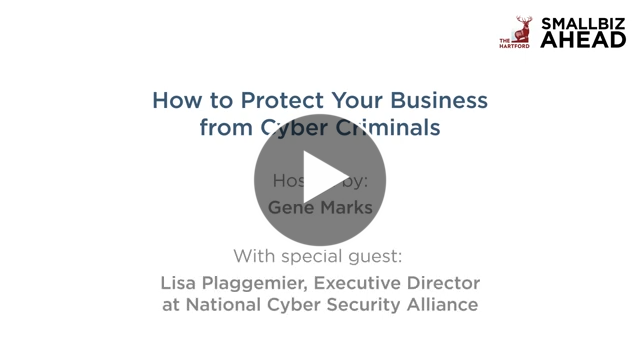
Cyber Criminals
This video features a conversation discussing cybersecurity for small and mid-size businesses. The presenters cover various topics, including the importance of updating passwords for Internet of Things devices and routers, the benefits of using password managers, the necessity of keeping operating systems up-to-date, and the risks associated with business email compromise. They emphasize the significance of multi-factor authentication (MFA) and advise against using debit cards for business transactions due to limited fraud protection. The discussion also touches on emerging threats like deepfakes and the importance of verifying requests for financial transactions.

Remote Workers
This video focuses on securing remote workers in the digital age. The presenter outlines five crucial actions for businesses to protect their work-from-home employees: upgrading to secure routers, implementing password vaults with multi-factor authentication, managing software patches and operating system updates, setting up virtual private networks (VPNs), and providing regular security training for employees. He emphasizes that while these measures may incur additional costs, they are essential investments to prevent potential security breaches that could severely impact a company’s operations.
Cyber Protection Tailored to Your Needs
Learn More about The Hartford Coverage & Pricing
No Spam. Promise!
The Hartford
Cyber Insurance 101
The Hartford
Cyber Insurance 101
The Hartford provides an overview of its cyber risk insurance offerings and the importance of such coverage in today’s digital landscape.
Cyber Risk Landscape
The document highlights the growing threat of cyber-attacks, noting:
- A 40% increase in global ransomware attacks over the last year.
- Phishing is responsible for 90% of ransomware attacks.
- The average ransom demand spiked to over $700,000 in Q2 2023, a 126% increase.
- Business email compromise (BEC) losses rose from $1.9B in 2020 to $2.7B in 2022.
CyberChoice Coverage
The Hartford’s CyberChoice policy offers comprehensive protection against cyber risks, including:
- Affirmative cyberterrorism coverage
- Incident response expenses, including voluntary notification
- Third-party service provider coverage
- Pre-claim investigation and prevention assistance
- Worldwide coverage territory
The policy is designed for various industries, including construction, entertainment, financial institutions, higher education, hospitality, manufacturing, retail, transportation, utility and energy, and wholesale distribution.
Value-Added Services
Policyholders gain access to:
- The Hartford Cyber Center: An online risk management portal with cybersecurity resources and employee training.
- 24/7 Cyber Claims Hotline: Guides clients through initial steps after a breach and assists with incident response and recovery.
- CyberChoice First Responders: A panel of professionals with expertise in cyber and breach response.
The Hartford’s Credentials
The Hartford emphasizes its standing in the industry:
- Ranked as the No. 3 Cyber Liability insurer
- Ranked as the No. 2 Professional Liability insurer
- Recognized as a “World’s Most Ethical Company®” 14 times by Ethisphere
Coverage Details
- Primary capacity for risks with revenues up to $500M
- Excess capacity for risks with revenues up to $1B
- Complete first and third-party cyber coverage included in the base form
The Hartford
Cyber Perception
The Hartford
Cyber Perception
The Hartford, an insurance company with over 200 years of experience, offers comprehensive cyber risk management solutions designed to help clients build resilience and minimize risk in an ever-changing cyber threat landscape. Their approach is characterized by flexibility, specialization, and a strong geographic presence.
Features of The Hartford’s Cyber Coverage
- Flexible Solutions: The Hartford provides standalone cyber coverage and options that blend cyber with Tech Errors & Omissions or Miscellaneous Professional Liability. They also offer excess capacity to meet diverse client needs.
- Broad Appetite: The company has an expansive appetite for cyber risks across various industries, with some exceptions such as in-patient healthcare, public entities, and K-12 education.
- Established Presence: With over 20 years of experience in Tech E&O policies, The Hartford has a well-established presence in the market, addressing a wide array of coverage needs.
- Specialized Expertise: The Hartford boasts experienced cyber underwriters and in-house claims handlers with the authority to manage a range of risks and provide quick turnarounds.
Risk Mitigation and Support
- Cyber Risk Mitigation Services: Insureds receive a network vulnerability scan and consultation access to The Hartford Cyber Center at no additional cost.
- Educational Resources: The Hartford offers a library of marketing materials, thought leadership articles, and webinars to help clients learn how to minimize cyber risk and build effective defense strategies.
- Dedicated Support: A team of dedicated underwriters is available to assist clients with tailored solutions to meet their specific needs.
Market Positioning
The Hartford positions itself as a comprehensive solution provider in the cyber insurance market. They address market needs such as:
1. Offering both cyber and technology coverage
2. Providing a broad appetite for cyber risks
3. Demonstrating a long-standing presence in the market
4. Offering specialized claims and underwriting knowledge
5. Providing cyber risk mitigation services
6. Offering guidance on evolving cyber risks
7. Providing direct access to a dedicated cyber team
By addressing these market needs, The Hartford aims to differentiate itself as a reliable and experienced partner in managing cyber threats for businesses across various industries.
The Hartford
Breach Response
The Hartford
Post-Breach Cyber-Response
The Hartford discusses the post-breach incident response process for businesses with a CyberChoice Secure Policy℠. It provides a step-by-step guide on what to do if a cyber breach occurs, emphasizing the importance of immediate action and the support provided by The Hartford.
Steps in Post-Breach Response
1. Immediate Reporting: The document stresses the importance of calling The Hartford’s 24/7 Cyber Incident Line as soon as a breach is detected.
2. Claims Professional Assistance: The Hartford’s experienced Claims professionals will explain coverage, recommend handling procedures, and help retain independent attorneys and vendors to deal with the breach effectively.
3. Forensic Investigation: A computer forensics expert can be consulted to investigate the breach, determining what happened, when it occurred, how it happened, and whether sensitive information was compromised.
4. Customer Notification: If necessary, The Hartford’s panel of professionals will assist in notifying customers, clients, or state regulators, including engaging crisis management services and coordinating service providers for various tasks.
5. Ongoing Support: The panel will provide assistance in monitoring customer responses, enrolling affected individuals in offered services, and providing transparent reports.
6. Legal and Regulatory Assistance: In case of lawsuits or regulatory investigations, The Hartford’s Claims Department and a panel of law firms will provide support in managing and defending these issues.
Post-Crisis Evaluation and Prevention
After the immediate crisis has passed, The Hartford emphasizes the importance of:
- Evaluating the cost of the event
- Recommending ways to tighten security
- Reducing vulnerabilities that led to the breach
- Ensuring continuous protection of important assets
The Hartford stresses that experiencing one breach doesn’t preclude the possibility of future incidents, highlighting the need for ongoing vigilance and protection.
What is Cyber Insurance
Cyber insurance is a specialized insurance product designed to protect businesses against the financial losses and disruptions that can arise from cyber-related incidents, such as data breaches, ransomware attacks, and other cyber threats. This type of insurance typically covers costs related to data recovery, legal fees, notification of affected parties, regulatory fines, and business interruption losses. Businesses need cyber insurance to mitigate the financial impact of cyber-attacks, ensuring they can quickly recover and continue operations while minimizing the potential damage to their reputation and customer trust.
What does cyber insurance cover?
Cyber insurance typically covers costs related to data breaches, including data recovery, legal fees, notification of affected parties, and regulatory fines. It may also cover business interruption losses and expenses related to restoring business operations.
Why is cyber insurance important for SMBs?
Small businesses, often with potentially weaker security measures, are prime targets for cyber attacks. Cyber insurance is a crucial tool in managing the financial burden of such attacks, ensuring they can recover quickly and sustain minimal operational disruption.
How is the cost of cyber insurance determined?
Factors such as the size of the business, the industry, the amount and type of data handled, and the company’s existing cybersecurity measures influence the cost of cyber insurance. Higher-risk businesses or those with poor security practices may face higher premiums.
What are the exclusions in a cyber insurance policy?
Standard exclusions in cyber insurance policies include claims related to pre-existing breaches, acts of war or terrorism, and the failure to maintain minimum security standards. It’s essential for businesses to review policy details to understand specific exclusions and limitations.


